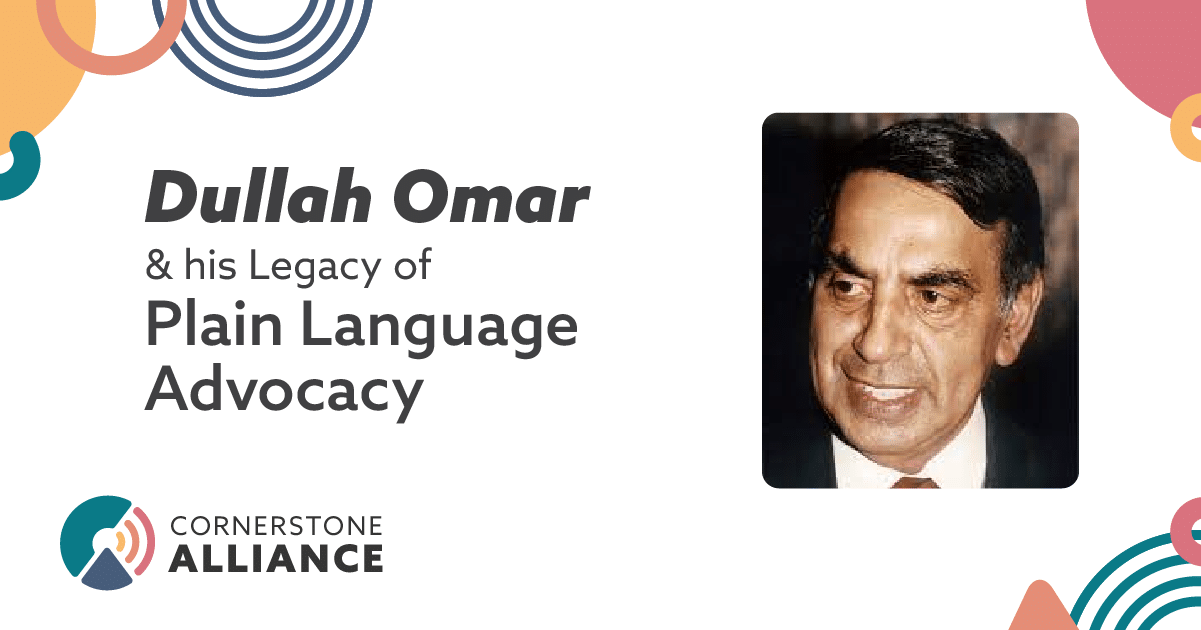Written by Samoda Silva
Recently, I was scrubbing through the recording of Polaron’s VicForum, keeping an ear out for captivating soundbites for some social posts. During my watch, I hear this quote, read out by Christopher Balmford from Words and Beyond:
Clear, simple communication is… an absolute and critical necessity for democracy. People have a right to understand the laws that govern them, to understand court proceedings in matters that affect them, to understand what the government is doing in their name.
Most importantly, plain language allows people to visualise themselves as subjects of the law, and to imagine themselves in the circumstances with which the law deals. This ability to place or imagine oneself within the law is an important distinction between a system of justice and a regime of enforced order”.
Now that’s a captivating soundbite.
This was my introduction to Dullah Omar, South African anti-Apartheid activist, lawyer, Minister for Justice and plain language advocate.
Omar called for a ‘plain, simple and understandable language’ in legislation, court judgments and contracts. He was passionate about what he called a ‘democratising language’ as the key to a system where governance and decision-making were not only conducted in the public’s best interest, but was actually implemented as such.
Omar’s movement for plain language led to the inclusion of plain language in various South African Acts, including the Consumer Protection Act, the National Credit Act 34 of 2005, and the Long-Term Insurance Act 52 of 1998. It is now expressed as a right in certain areas of law and policy, and certain information must be published in plain language by law, including service contracts, information on banking products and services and company documents.
As a law student, the more and more I delve into the legal world, it becomes increasingly apparent that people pay lawyers hundreds and thousands of dollars not only for their legal expertise, but equally for their ability to understand the complex and technical language that pervades every aspect of the law. In other words, lawyers’ comprehension of legal terminology is just as valuable to clients as their actual legal advice. Even a simple insurance claim is blockaded by a wall of dense legal jargon that a reasonable person, let alone someone with English as an additional language, low literacy or a learning difficulty or disability, would find difficult to navigate independently. Excessive inaccessible language is as much a barrier to justice as the strict and slow procedures associated with the law and the exorbitant cost of legal advice. In a plain language convention held in South Africa, Omar stated that only 0.3% of African children had received grants that they were entitled to, calling on the excess of complicated government forms within an already complicated bureaucratic environment as the reason why.
The work of Dullah Omar that put plain language in the spotlight bears some important lessons for all of us.
Firstly, plain language upholds and reflects the law just as much as jargonistic language does. There is much tradition associated with the law, but that does not mean that we must stick with the arcane terminology of the past.
Furthermore, wording is everything when it comes to the law. Most litigation is grounded upon interpreting the meaning of a single phrase or word, which is ultimately interpreted by the court on its ordinary meaning anyway. Maybe if a word or phrase in a document to be relied upon was too ambiguous to give rise to legal proceedings and requires interpretation by the court, then maybe it wasn’t the right word to begin with.
Moreover, plain language does not tarnish the legal industry, or depreciate the work of lawyers. Plain language principles simply make the legal system more humanistic, which for a system that applies to everyone without exception or fluctuation, should naturally be the case. Plain language is a mastery in itself, and lawyers would retain great benefit in enhancing the work they do already, which is to aid their clients in navigating the legal world. Omar put it best by saying ‘[t]he use of language above the heads of the average citizen may swell the heads of its users, but it does little else’.
Dullah Omar was a big thinker and equally a big changemaker. He showed us never to settle for the status quo if it is less than honourable to the rights we are all entitled to. His humble approach to governance dismantled the pedestal of power associated with elected leaders, elevating the people instead. Omar’s legacy should inspire us all to continue advocating for plain language and equal access to information. This endeavour extends beyond merely upholding democratic principles; it contributes to something much more profound – a society where everyone is valued and included, and feels that way too.
